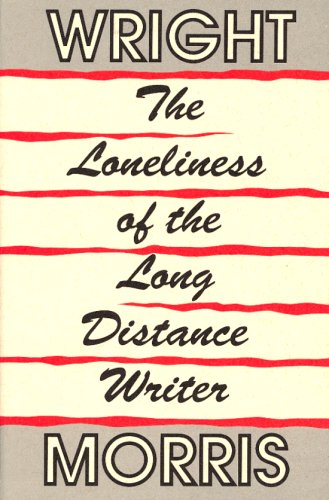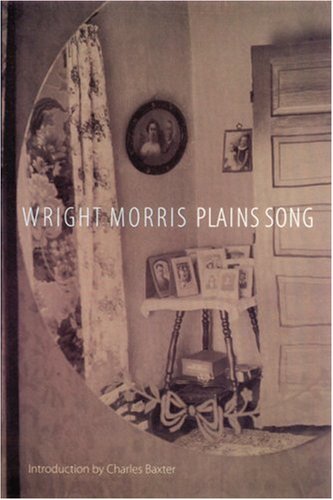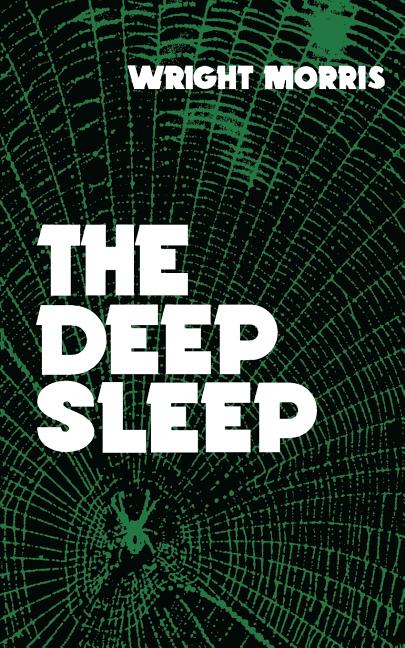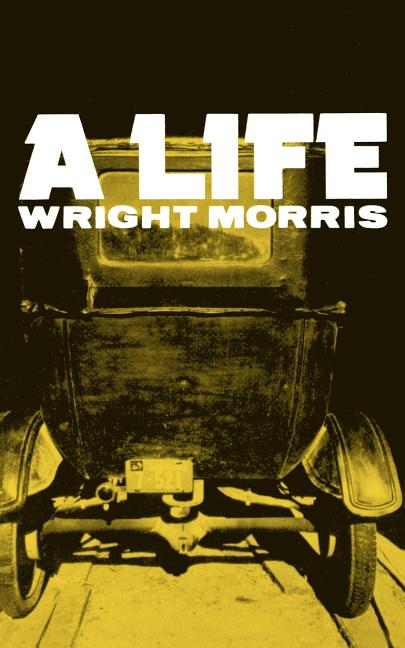Two for the Road brings together a pair of thematically related novels, Man and Boy (1951) and In Orbit (1967), each of which concerns a rural American community's response to petty tyranny.

Two for the Road brings together a pair of thematically related novels, Man and Boy (1951) and In Orbit (1967), each of which concerns a rural American community's response to petty tyranny.

Writing My Life brings together in one volume the acclaimed memoirs of the National Book Award-winning writer Wright Morris.

The Loneliness of the Long-Distance Writer brings together two of Wright Morris's best-known novels, The Works of Love (1951) and The Huge Season (1954).

Collects three of Wright Morris's most memorable explorations of old age: The Fork River Space Project (1977), Fire Sermon (1971), and A Life (1973). Fork River, Kansas, was established in the 1870s by a railroad tycoon as a gift for his young bride. Never populous, it is now, in 1977, a ghost town or it would be if it weren't for the presence of Kelcey, an elderly writer, Alice, his young wife, and Dahlberg, the independent contractor who keeps their water running, their porch painted, and their married life unpredictable. In town, the shops have closed one by one, their proprietors disappearing, as it were, into thin air. Did they find better prospects elsewhere? Or were they abducted by space aliens? Kelcey thinks the latter, but what does the old man know? He can't even see that Alice is being abducted from him by the hired help... In Fire Sermon, Morris returns with a more mature sensibility to the premise of his first novel, My Uncle Dudley (1942). A ten-year-old boy named Kermit accompanies his eighty-two-year-old guardian, Uncle Floyd, from their trailer home in California to a small town in Nebraska for the funeral of Floyd's only surviving sibling, Viola. Along the way, Floyd picks up a hitchhiking hippie couple named Stanley and Joy, and is disturbed by the realization that his nephew has more in common with them than with him. After Viola's old house, a storehouse of family artifacts, burns to the ground, Floyd, cut free from his past and ready for death, abandons Kermit to an uncertain future with Stanley and Joy. A Life (1973) is the sequel to Fire Sermon, revealing what lies in store for Floyd after he has disappeared into the open, empty spaces of Nebraska. The aging, uprooted Floyd, now unmoored in time, indulges in an unhurried but intensely nostalgic reconstruction of his family's and his own past. When he befriends Mr. Blackbird, a transient Indian, Floyd is doomed by his inability (or his unwillingness) to focus on the present and to contemplate a future for himself. Or has he introduced himself to Blackbird as a way of speeding along his own wished-for demise?


"It is a curse in this family that the women bear only daughters, if anything at all."
So begins this hypnotic elegy of the women of the Nebraska plains, winner of the National Book Award. This is the story of the Atkins family, who settle, farm, and raise three generations from the early years of this century. In particular, it portrays the Atkins women and the world they create among themselves. At the heart of the novel is Cora, the resourceful and resolute matriarch whose nobility is a profoundly sustaining life-force. Her intractable submission to the rhythms of the natural order reveeals a tragic and intensely moral innocence. Her sister-in-law, Belle, is a spirited woman who dies in childbirth. The mercurial Sharon Rose, the niece whom Cora raises, carries the story forward far in time and distance from the narrow life of the farm. Refusing to follow Cora's example, she flees to the sophistication of the East with a fury and rebelliousness that darken her spirit. Years later she will return to the plains to confront her flight and to realize fully the dignity of Cora's life.

Fork River, Kansas, was established in the 1870s by a railroad tycoon as a gift for his young bride. Never populous, it is now, in 1977, a ghost town or it would be if it weren't for the presence of Kelcey, an elderly writer, Alice, his young wife, and Dahlberg, the independent contractor who keeps their water running, their porch painted, and their married life unpredictable. In town, the shops have closed one by one, their proprietors disappearing, as it were, into thin air. Did they find better prospects elsewhere? Or were they abducted by space aliens? Kelcey thinks the latter, but what does the old man know? He can't even see that Alice is being abducted from him by the hired help...

" 'Judge' Howard Potter, one of the most respected and influential citizens of a suburban town outside of Philadelphia, lies dead after a long and wearying illness. He is survived by the five people who knew him best and whose lives were deeply influenced by him . . .Through the thoughts and reminiscences of these five very different people Mr. Morris tells his story . . . [His] writing is occasionally obscure but always absorbing. He does not, like so many writers, hover omnisciently over his characters. He prefers to project himself into their innermost and very human thoughts and emotions, leaving the reader to draw his own conclusions . . . Mr. Morris writes with wit, taste, and refreshing originality." —William Murray, Saturday Review
"Mr. Morris is a master of the exact phrase, the homely illuminating detail, and it is no accident that he is an excellent photographer . . . His writing is simple, but his method is as complete as his subject matter, so he uses the multiple flashback, the melting of past into present." —E.M. Scott, New York Herald-Tribune Book Review

Floyd Warner, eighty-two, has driven from California to his childhood home in Nebraska in his antique Maxwell coupe. There he confronts the smoldering remains of his late sister's house and the realization that he is now completely alone. As though in a trance, he sets out once again, this time to find his first adult home, a dusty sheep farm in the southwest, preparing to meet the fate that ultimately awaits him. Of such deceptively simple ingredients is this brilliant portrait of the last hours of an old man's life composed. Floyd Warner, who first appeared in Fire Sermon, is perhaps the ultimate characterization in the career of a writer who has been called "quite simply the best novelist now writing in America" (John W. Aldridge).

Written twenty years before it was first published in 1972, War Games features both black and charcoal-gray humor, whose characters and events are as unpredictable as they are absorbing—a book, in the author's words, "where the extremity of the bizarre is seen as the ultimate effort to change oneself, if not the world." At the center of the novel is the developing relationship between the protagonist, a fifty-three-year-old army colonel, and a Viennese immigrant whom he first knows as Mrs. Tabori and whose story he has learned through a dying amputee, Human Kopfman. Themes and characters that first appear in War Games reappear in The Field of Vision and Ceremony in Lone Tree.
In the preface to this edition, Wright Morris describes the genesis of the book in 1951 and comments on its connections with his late work: "War Games may well prove to be the seedbed of much more in my fiction than I am aware, since it was the first turning of earth more than twenty years buried. My novels are linked in this manner, but sometimes at odds with the chronology of publication. In the absence of War Games, many clues to the fiction that followed were missing . . . [This novel] seems to me darkly somber, a book of interiors, dimly lighted streets, hallways and lobbies, with glimpses of objects and colors that emerge in subdued lighting. I'd like to think that my readers, both new and old, will find the world of the Colonel and Mrs. Tabori relevant to the one in which they are living."
